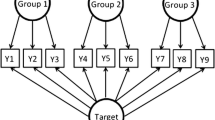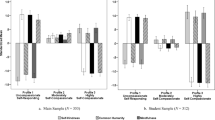Abstract
Objectives
This experience sampling study examined the roles of trait self-compassion in everyday self-control. Specifically, this study examined whether trait self-compassion influences people’s self-efficacy in handling difficult self-control demands, and subsequently, their self-control success.
Method
The participants were asked to respond to five random signals per day for seven consecutive days. When responding to each signal, they first indicated if they had exerted self-control over the past 30 min and, if yes, reported their momentary self-control experiences such as perceived difficulty, self-efficacy, and success. Trait self-compassion was measured 1 week before the experience sampling phase. A total of 1725 self-control episodes from 115 college students were analyzed.
Results
No main effects of trait self-compassion on self-control difficulty, self-efficacy, and success were observed. Nevertheless, trait self-compassion interacted with perceived difficulty in predicting self-efficacy. Specifically, perceived difficulty was associated with reduced self-efficacy, only among individuals low in trait self-compassion.
Conclusions
Self-compassionate people appeared to be better at protecting self-efficacy when dealing with difficult self-control tasks. The findings provide nuanced views on how trait self-compassion may be beneficial to self-control in everyday life.


Similar content being viewed by others
Data Availability
The data analyzed in the current study are available at the Open Science Framework (http://osf.io/dp8e6/).
References
Bandura, A. (1982). Self-efficacy mechanism in human agency. American Psychologist, 37(2), 122–147. https://doi.org/10.1037/0003-066x.37.2.122.
Bandura, A. (1997). Self-efficacy: The exercise of control. New York: Macmillan.
Baumeister, R. F., & Exline, J. J. (1999). Virtue, personality, and social relations: self-control as the moral muscle. Journal of Personality, 67(6), 1165–1194. https://doi.org/10.1111/1467-6494.00086.
Baumeister, R. F., & Vohs, K. D. (2007). Self-regulation, ego depletion, and motivation. Social and Personality Psychology Compass, 1(1), 115–128. https://doi.org/10.1111/j.1751-9004.2007.00001.x.
Baumeister, R. F., Vohs, K. D., & Tice, D. M. (2007). The strength model of self-control. Current Directions in Psychological Science, 16(6), 351–355. https://doi.org/10.1111/j.1467-8721.2007.00534.x.
Biber, D. D., & Ellis, R. (2019). The effect of self-compassion on the self-regulation of health behaviors: a systematic review. Journal of Health Psychology, 24(4), 2060–2071. https://doi.org/10.1177/1359105317713361.
Blackie, R. A., & Kocovski, N. L. (2018). Examining the relationships among self-compassion, social anxiety, and post-event processing. Psychological Reports, 121(4), 669–689. https://doi.org/10.1177/0033294117740138.
Blanden, G., Butts, C., Reid, M., & Keen, L. (2018). Self-reported lifetime violence exposure and self-compassion associated with satisfaction of life in historically Black college and university students. Journal of Interpersonal Violence. https://doi.org/10.1177/0886260518791596.
Bluth, K., & Neff, K. D. (2018). New frontiers in understanding the benefits of self-compassion. Self and Identity, 17(6), 605–608. https://doi.org/10.1080/15298868.2018.1508494.
Brion, J. M., Leary, M. R., & Drabkin, A. S. (2014). Self-compassion and reactions to serious illness: the case of HIV. Journal of Health Psychology, 19(2), 218–229. https://doi.org/10.1177/1359105312467391.
Ceccarelli, L., Giuliano, R. J., Glazebrook, C., & Strachan, S. (2019). Self-compassion and psycho-physiological recovery from recalled sport failure. Frontiers in Psychology, 10, 1564. https://doi.org/10.1177/1359105312467391.
Chow, J. T., Hui, C. M., & Lau, S. (2015). A depleted mind feels inefficacious: ego-depletion reduces self-efficacy to exert further self-control. European Journal of Social Psychology, 45(6), 754–768. https://doi.org/10.1002/ejsp.2120.
Daly, M., Delaney, L., Egan, M., & Baumeister, R. F. (2015). Childhood self-control and unemployment throughout the life span: evidence from two British cohort studies. Psychological Science, 26(6), 709–723. https://doi.org/10.1177/0956797615569001.
De Ridder, D. T., Lensvelt-Mulders, G., Finkenauer, C., Stok, F. M., & Baumeister, R. F. (2018). Taking stock of self-control: a meta-analysis of how trait self-control relates to a wide range of behaviors. In R. F. Baumeister (Ed.), Self-Regulation and self-control (pp. 221–274). Abingdon: Routledge.
Duckworth, A. L., & Seligman, M. E. (2017). The science and practice of self-control. Perspectives on Psychological Science, 12(5), 715–718. https://doi.org/10.1177/1745691617690880.
Ferrari, M., Hunt, C., Harrysunker, A., Abbott, M. J., Beath, A. P., & Einstein, D. A. (2019). Self-compassion interventions and psychosocial outcomes: a meta-analysis of RCTs. Mindfulness, 10(8), 1–19. https://doi.org/10.1007/s12671-019-01134-6.
Finlay-Jones, A. L., Rees, C. S., & Kane, R. T. (2015). Self-compassion, emotion regulation and stress among Australian psychologists: testing an emotion regulation model of self-compassion using structural equation modeling. PLoS One, 10(7), e0133481. https://doi.org/10.1371/journal.pone.0133481.
Friese, M., Frankenbach, J., Job, V., & Loschelder, D. D. (2017). Does self-control training improve self-control? A meta-analysis. Perspectives on Psychological Science, 12(6), 1077–1099. https://doi.org/10.1177/1745691617697076.
Fujita, K. (2011). On conceptualizing self-control as more than the effortful inhibition of impulses. Personality and Social Psychology Review, 15(4), 352–366. https://doi.org/10.1177/1088868311411165.
Gilbert, P. (2005). Compassion and cruelty: a biopsychosocial approach. In Gilbert (Ed.), Compassion: Conceptualisations, research, and use in psychotherapy (pp. 9–74). Abingdon: Routledge.
Gilbert, P. (2009). The compassionate mind. London: Consa Robinson.
Hagger, M. S., Wood, C., Stiff, C., & Chatzisarantis, N. L. (2010). Ego depletion and the strength model of self-control: a meta-analysis. Psychological Bulletin, 136(4), 495–525. https://doi.org/10.1037/a0019486.
Hallion, M., Taylor, A., Roberts, R., & Ashe, M. (2019). Exploring the association between physical activity participation and self-compassion in middle-aged adults. Sport, Exercise, and Performance Psychology, 8(3), 305–316. https://doi.org/10.1037/spy0000150.
Heatherton, T. F., & Tice, D. M. (1994). Losing control: how and why people fail at self-regulation. San Diego: Academic.
Hofmann, W., & Patel, P. V. (2015). SurveySignal: a convenient solution for experience sampling research using participants’ own smartphones. Social Science Computer Review, 33(2), 235–253. https://doi.org/10.1177/0894439314525117.
Homan, K. J., & Sirois, F. M. (2017). Self-compassion and physical health: exploring the roles of perceived stress and health-promoting behaviors. Health Psychology Open, 4(2), 2055102917729542. https://doi.org/10.1177/2055102917729542.
Inzlicht, M., & Schmeichel, B. J. (2012). What is ego depletion? Toward a mechanistic revision of the resource model of self-control. Perspectives on Psychological Science, 7(5), 450–463. https://doi.org/10.1177/1745691612454134.
Jazaieri, H., McGonigal, K., **pa, T., Doty, J. R., Gross, J. J., & Goldin, P. R. (2014). A randomized controlled trial of compassion cultivation training: effects on mindfulness, affect, and emotion regulation. Motivation and Emotion, 38(1), 23–35. https://doi.org/10.1007/s11031-013-9368-z.
Kelly, A. C., Zuroff, D. C., Foa, C. L., & Gilbert, P. (2010). Who benefits from training in self-compassionate self-regulation? A study of smoking reduction. Journal of Social and Clinical Psychology, 29(7), 727–755. https://doi.org/10.1521/jscp.2010.29.7.727.
Leary, M. R., Tate, E. B., Adams, C. E., Batts Allen, A., & Hancock, J. (2007). Self-compassion and reactions to unpleasant self-relevant events: the implications of treating oneself kindly. Journal of Personality and Social Psychology, 92(5), 887–904. https://doi.org/10.1037/0022-3514.92.5.887.
Mantzios, M., Wilson, J. C., Linnell, M., & Morris, P. (2015). The role of negative cognition, intolerance of uncertainty, mindfulness, and self-compassion in weight regulation among male army recruits. Mindfulness, 6(3), 545–552. https://doi.org/10.1007/s12671-014-0286-2.
Marshall, S. L., Parker, P. D., Ciarrochi, J., Sahdra, B., Jackson, C. J., & Heaven, P. C. (2015). Self-compassion protects against the negative effects of low self-esteem: a longitudinal study in a large adolescent sample. Personality and Individual Differences, 74, 116–121. https://doi.org/10.1016/j.paid.2014.09.049.
Molden, D. C., Hui, C. M., & Scholer, A. A. (2016). Understanding self-regulation failure: a motivated effort-allocation account. In E. R. Hirt, J. J. Clarkson, & L. Jia (Eds.), Self-regulation and ego control (pp. 425–459). Amsterdam: Elsevier.
Mooijman, M., Meindl, P., Oyserman, D., Monterosso, J., Dehghani, M., Doris, J. M., & Graham, J. (2018). Resisting temptation for the good of the group: binding moral values and the moralization of self-control. Journal of Personality and Social Psychology, 115(3), 585–599. https://doi.org/10.1037/pspp0000149.
Muris, P., & Petrocchi, N. (2017). Protection or vulnerability? A meta-analysis of the relations between the positive and negative components of self-compassion and psychopathology. Clinical Psychology and Psychotherapy, 24(2), 373–383. https://doi.org/10.1002/cpp.2005.
Neff, K. (2003). Self-compassion: an alternative conceptualization of a healthy attitude toward oneself. Self and Identity, 2(2), 85–101. https://doi.org/10.1080/15298860309032.
Neff, K. D., Hsieh, Y. P., & Dejitterat, K. (2005). Self-compassion, achievement goals, and co** with academic failure. Self and Identity, 4(3), 263–287. https://doi.org/10.1080/13576500444000317.
Neff, K. D., Rude, S. S., & Kirkpatrick, K. L. (2007). An examination of self-compassion in relation to positive psychological functioning and personality traits. Journal of Research in Personality, 41(4), 908–916. https://doi.org/10.1016/j.jrp.2006.08.002.
Petersen, L. E. (2014). Self-compassion and self-protection strategies: the impact of self-compassion on the use of self-handicap** and sandbagging. Personality and Individual Differences, 56, 133–138. https://doi.org/10.1016/j.paid.2013.08.036.
Preacher, K. J., Zyphur, M. J., & Zhang, Z. (2010). A general multilevel SEM framework for assessing multilevel mediation. Psychological Methods, 15(3), 209–233. https://doi.org/10.1037/a0020141.
Preacher, K. J., Zhang, Z., & Zyphur, M. J. (2016). Multilevel structural equation models for assessing moderation within and across levels of analysis. Psychological Methods, 21(2), 189–205. https://doi.org/10.1037/met0000052.
Raes, F., Pommier, E., Neff, K. D., & Van Gucht, D. (2011). Construction and factorial validation of a short form of the self-compassion scale. Clinical Psychology and Psychotherapy, 18(3), 250–255. https://doi.org/10.1002/cpp.702.
Saunders, B., Milyavskaya, M., & Inzlicht, M. (2015). Variation in cognitive control as emotion regulation. Psychological Inquiry, 26(1), 108–115. https://doi.org/10.1002/cpp.702.
Scollon, C. N., Prieto, C. K., & Diener, E. (2009). Experience sampling: promises and pitfalls, strength and weaknesses. Journal of Happiness Studies, 4, 5–31. https://doi.org/10.1023/A:1023605205115.
Semenchuk, B. N., Strachan, S. M., & Fortier, M. (2018). Self-compassion and the self-regulation of exercise: reactions to recalled exercise setbacks. Journal of Sport and Exercise Psychology, 40(1), 31–39. https://doi.org/10.1123/jsep.2017-0242.
Shimai, S., Otake, K., Park, N., Peterson, C., & Seligman, M. E. (2006). Convergence of character strengths in American and Japanese young adults. Journal of Happiness Studies, 7(3), 311–322. https://doi.org/10.1007/s10902-005-3647-7.
Sirois, F. M., Nauts, S., & Molnar, D. S. (2019). Self-compassion and bedtime procrastination: an emotion regulation perspective. Mindfulness, 10(3), 434–445. https://doi.org/10.1007/s12671-018-0983-3.
Tangney, J. P., Baumeister, R. F., & Boone, A. L. (2004). High self-control predicts good adjustment, less pathology, better grades, and interpersonal success. Journal of Personality, 72(2), 271–324. https://doi.org/10.1111/j.0022-3506.2004.00263.x.
Usher, E. L., & Pajares, F. (2006). Sources of academic and self-regulatory efficacy beliefs of entering middle school students. Contemporary Educational Psychology, 31(2), 125–141. https://doi.org/10.1016/j.cedpsych.2005.03.002.
Uziel, L., & Baumeister, R. F. (2017). The self-control irony: desire for self-control limits exertion of self-control in demanding settings. Personality and Social Psychology Bulletin, 43(5), 693–705. https://doi.org/10.1177/0146167217695555.
Funding
The present study was supported by the Faculty Development Scheme of the Research Grants Council of Hong Kong (project no. UGC/FDS15/H03/16).
Author information
Authors and Affiliations
Contributions
TC designed and executed the study, performed the data analysis, and wrote the paper. CH collaborated in the design of the study and the editing of the final manuscript. All authors approved the final version of the manuscript for submission.
Corresponding author
Ethics declarations
Conflict of Interest
The authors declare that they have no conflict of interest.
Ethics Approval
This study was approved by the Human Research Ethics Board of the Hong Kong Shue Yan University.
Informed Consent
Written informed consent was obtained from all individual participants included in the study.
Additional information
Publisher’s Note
Springer Nature remains neutral with regard to jurisdictional claims in published maps and institutional affiliations.
Electronic Supplementary Material
ESM 1
(DOCX 17 kb)
Rights and permissions
About this article
Cite this article
Chow, T.S., Hui, C.M. How Does Trait Self-Compassion Benefit Self-Control in Daily Life? An Experience Sampling Study. Mindfulness 12, 162–169 (2021). https://doi.org/10.1007/s12671-020-01509-0
Accepted:
Published:
Issue Date:
DOI: https://doi.org/10.1007/s12671-020-01509-0




